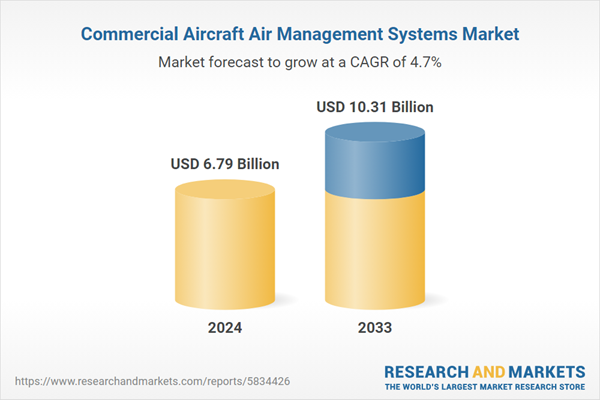Commercial aircraft air management systems are responsible for regulating and maintaining a comfortable environment for passengers and crew during flights. They include cabin pressure control, thermal management, oxygen, ice protection, and engine bleed air systems. They comprise of several components, such as air conditioning units, distribution ducts, air filters, pressurization units, and ventilation systems. Commercial aircraft air management systems are widely used to regulate humidity and temperature inside the cabin, maintain pressure, control air quality, and ensure adequate oxygen supply. They aid in enhancing passenger and crew comfort, improving safety, and preventing altitude sickness, hypoxia, and other health problems. They are also \ highly energy-efficient systems that reduce operational costs, minimize fuel consumption and ensure a pleasant flying experience.
Commercial Aircraft Air Management Systems Market Trends:
The rising demand for air travel across the globe is one of the primary factors strengthening the market growth. Commercial aircraft air management systems are essential equipment installed on various passenger aircraft to ensure a comfortable flying experience, enhance customer satisfaction, and prevent health complications during flights. In addition to this, the widespread system demand owing to rapid fleet modernization activities by airline operators is acting as another growth-inducing factor. Furthermore, the implementation of strict government regulations to maintain quality standards of aircraft and ensure optimum safety of passengers and flight crew is providing an impetus to the market growth. Additionally, the introduction of advanced air filtration systems that utilize high-efficiency particulate air (HEPA) filters to improve air quality and remove pollutants, bacteria, and viruses is positively influencing the market growth. Apart from this, the utilization of the Internet of Things (IoT) sensors to accurately measure changes in cabin air quality and allow real-time adjustments are contributing to market growth. Moreover, the emerging trend of sustainable aviation is facilitating the demand for modern and lightweight air management systems, which improve energy efficiency, reduce fuel consumption, minimize carbon footprint, and enhance operational capabilities. Besides this, the growing system demand to prevent the spread of infectious diseases and detect potential hazards, such as smoke and fire, owing to increasing emphasis on passenger safety, is providing a thrust to the market growth. Other factors, increasing rising international travel and tourism activities, increasing investments in the research and development (R&D) of advanced systems, and the growing airline focus on passenger comfort, are anticipated to drive the market growth.Key Market Segmentation:
The publisher provides an analysis of the key trends in each segment of the global commercial aircraft air management systems market, along with forecasts at the global, regional, and country levels from 2025-2033. Our report has categorized the market based on system and application.System Insights:
- Thermal Management System
- Cabin Pressure Control System
- Oxygen System
- Ice Protection System
- Engine Bleed Air System
- Fuel Tank Inerting System
Application Insights:
- Narrow-body Aircraft
- Wide-body Aircraft
- Regional Jets
Regional Insights:
- North America
- United States
- Canada
- Asia Pacific
- China
- Japan
- India
- South Korea
- Australia
- Indonesia
- Others
- Europe
- Germany
- France
- United Kingdom
- Italy
- Spain
- Russia
- Others
- Latin America
- Brazil
- Mexico
- Others
- Middle East and Africa
Competitive Landscape:
The report has also provided a comprehensive analysis of the competitive landscape in the global commercial aircraft air management systems market. Competitive analysis such as market structure, market share by key players, player positioning, top winning strategies, competitive dashboard, and company evaluation quadrant has been covered in the report. Also, detailed profiles of all major companies have been provided. Some of the companies covered include Aeronamic BV, Boyd Corporation (Goldman Sachs Group, Inc.), Cox & Company Inc, Diehl Stiftung & Co. KG, Honeywell International Inc., Parker Meggitt (Parker Hannifin Corporation), Raytheon Technologies Corporation, Safran SA, Thales Group, The Liebherr Group, etc. Kindly note that this only represents a partial list of companies, and the complete list has been provided in the report.Key Questions Answered in This Report
- How big is the global commercial aircraft air management systems market?
- What is the expected growth rate of the global commercial aircraft air management systems market during 2025-2033?
- What are the key factors driving the global commercial aircraft air management systems market?
- What has been the impact of COVID-19 on the global commercial aircraft air management systems market?
- What is the breakup of the global commercial aircraft air management systems market based on the system?
- What is the breakup of the global commercial aircraft air management systems market based on the application?
- What are the key regions in the global commercial aircraft air management systems market?
- Who are the key players/companies in the global commercial aircraft air management systems market?
Table of Contents
Companies Mentioned
- Aeronamic BV
- Boyd Corporation (Goldman Sachs Group Inc.)
- Cox & Company Inc
- Diehl Stiftung & Co. KG
- Honeywell International Inc.
- Parker Meggitt (Parker Hannifin Corporation)
- Raytheon Technologies Corporation
- Safran SA
- Thales Group
- The Liebherr Group
Table Information
| Report Attribute | Details |
|---|---|
| No. of Pages | 146 |
| Published | March 2025 |
| Forecast Period | 2024 - 2033 |
| Estimated Market Value ( USD | $ 6.79 Billion |
| Forecasted Market Value ( USD | $ 10.31 Billion |
| Compound Annual Growth Rate | 4.7% |
| Regions Covered | Global |
| No. of Companies Mentioned | 10 |









